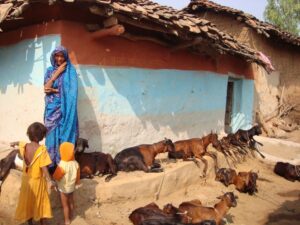Our basic principle (the 3 pillars)
The people whose lives are directly affected by hunger and poverty are not seen as a problem – rather, they play the key role in identifying, planning and implementing sustainable solutions. With their creativity, skills, resources and decision-making power, they themselves develop and redesign their lives.
The Hunger Project:
Start with Women
Women bear almost all responsibility for meeting basic needs of the family, yet are systematically denied the resources, information and freedom of action they need to fulfill this responsibility.
The vast majority of the world’s poor are women. Two-thirds of the world’s illiterate population are female. Of the millions of school age children not in school, the majority are girls And today, HIV/AIDS is rapidly becoming a woman’s disease. Women comprise nearly 60% of all people living with HIV/AIDS in Sub-Saharan Africa.
Studies show that when women are supported and empowered, all of society benefits. Their families are healthier, more children go to school, agricultural productivity improves and incomes increase. In short, communities become more resilient.
We firmly believe that empowered women are the key change agents and are the essential element to achieving the end of hunger and poverty. Wherever we work, our programs aim to support women and build their capacity.
Mobilize Communities
Our strategies seek to build people’s capacities, leadership and confidence. We train women and men, equipping them with the skills, methods and knowledge needed to take self-reliant actions to improve their lives and conditions in their communities. In Africa, this is carried out with our Epicenter Strategy.
There are other vital steps in mobilization. We have additional trainings for local animators. These leaders become the spark plugs for local action. As people take more substantial action, we provide skills trainings in literacy, numeracy, nutrition and local laws. We organize people into self-help groups to gain a stronger voice. Success builds on success.
Engage local Government
Local government is closest to the people and has the mission of working with people to meet their basic needs. The Hunger Project works in partnership with local government bodies to ensure that they are effective, include the leadership of women, are directly accountable to local people, and provide access to resources and information.
In order to strengthen local government, we work from the top down, lobbying for state and national law changes, and in some cases court rulings, to shift power to the hands of the people.
With their creativity, their potential and their own resources, local people play a key role in overcoming chronic hunger. For this reason, the work in developing countries is led and carried out only by compatriots.
Income generating goat breeding project

Our basic principle (the 3 pillars)
The people whose lives are directly affected by hunger and poverty are not seen as a problem – rather, they play the key role in identifying, planning and implementing sustainable solutions. With their creativity, skills, resources and decision-making power, they themselves develop and redesign their lives.
The Hunger Project:
Start with Women
Women bear almost all responsibility for meeting basic needs of the family, yet are systematically denied the resources, information and freedom of action they need to fulfill this responsibility.
The vast majority of the world’s poor are women. Two-thirds of the world’s illiterate population are female. Of the millions of school age children not in school, the majority are girls And today, HIV/AIDS is rapidly becoming a woman’s disease. Women comprise nearly 60% of all people living with HIV/AIDS in Sub-Saharan Africa.
Studies show that when women are supported and empowered, all of society benefits. Their families are healthier, more children go to school, agricultural productivity improves and incomes increase. In short, communities become more resilient.
We firmly believe that empowered women are the key change agents and are the essential element to achieving the end of hunger and poverty. Wherever we work, our programs aim to support women and build their capacity.
Mobilize Communities
Our strategies seek to build people’s capacities, leadership and confidence. We train women and men, equipping them with the skills, methods and knowledge needed to take self-reliant actions to improve their lives and conditions in their communities. In Africa, this is carried out with our Epicenter Strategy.
There are other vital steps in mobilization. We have additional trainings for local animators. These leaders become the spark plugs for local action. As people take more substantial action, we provide skills trainings in literacy, numeracy, nutrition and local laws. We organize people into self-help groups to gain a stronger voice. Success builds on success.
Engage local Government
Local government is closest to the people and has the mission of working with people to meet their basic needs. The Hunger Project works in partnership with local government bodies to ensure that they are effective, include the leadership of women, are directly accountable to local people, and provide access to resources and information.
In order to strengthen local government, we work from the top down, lobbying for state and national law changes, and in some cases court rulings, to shift power to the hands of the people.
With their creativity, their potential and their own resources, local people play a key role in overcoming chronic hunger. For this reason, the work in developing countries is led and carried out only by compatriots.
Income generating goat breeding project


